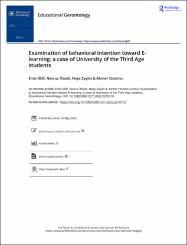Examination of behavioral intention toward E-learning: a case of University of the Third Age students
Citation
İBİlİ, E., İlhanli, N., Zayİm, N., & Yardımcı, A. (2022). Examination of behavioral intention toward E-learning: a case of University of the Third Age students. Educational Gerontology, 1-20.Abstract
This study was aimed at determining the factors that affect the intentions of University of the Third Age (UTA) students toward e-learning systems by using Structural Equation Modeling. For this purpose, factors such as Self-Efficacy, Experience, Social Norms, Enjoyment, and Anxiety, suggested as external factors in the General Extended Technology Acceptance Model for E-Learning (GETAMEL) model, were included in the UTATAM model developed within the scope of this research. The research was carried out with a total of 210 students studying at The University of the Third Age at Akdeniz University and Ege University. The results of the study indicate that the Experience factor has a strong effect on Anxiety, Self-efficacy, and Perceived Enjoyment. In addition, it was found that Anxiety, Self-efficacy, and Social Norms were effective on perceived Ease of Use, while Perceived Enjoyment and Social Norms were effective on Perceived Usefulness. On the other hand, while the mean scores of Perceived Usefulness and Social Norms were higher in favor of female, the mean scores of Experiences were higher in favor of male. The results indicated that participants’ age and lifestyle did not affect the mean scores of individuals in terms of all factors. In terms of Behavioral Intentions, the average population of countries has been increasing rapidly in recent years. The results of this research study are crucial for shedding light on educational institutions and other relevant institutions in order to determine the factors that affect the intentions of UTA students toward the use of e-learning systems.
















